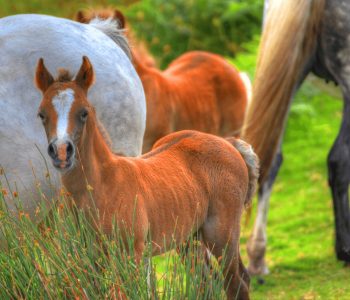Balanced nutrition and its importance for post weaning foals
The weaning period for some horse breeds, such as the American Quarter Horse, takes place during the beginning of the year in Brazil. According to veterinarian Claudia Ceola, owners invest heavily in genetics, acquiring imported stallions and expensive mare embryos. Nonetheless, when these foals are born, 50% of their potential depends upon their genetics and the rest depends on the environment where they are raised. Amongst which nutrition plays an important role.
“A balanced diet is essential for the activation of such genes and to allow the expression of animals’ full genetic potential.” Claudia points out. She explains that the beginning of the equestrian calendar for the American Quarter Horse breed is on July 1. It is during this time that the birth of foals begins, which means that in January, the majority of the foals are six months old when the start to be weaned. “This phase is very significant for them, as they are no longer feeding from the mare,” she details.
The veterinarian also points out that up until the third month of life, 99% of the foal’s feed is composed by the mare’s milk. From that moment on the quality of the milk starts to drop, and for such the gradual introduction of solid feed supply is recommended. “In the period comprised between six months and one year of age, 80% of the foals’ nutrition derives from feed.” Claudia states.
Impacts of the weaning process
The expert notes that weaning is a process that generates stress, due to changes in animal management and nutrition. Considering that during this period, foals transition towards a diet composed by balanced feed and pasture. However, during this time their gastrointestinal tract is still underdeveloped, and is not capable of assimilating the new dietary components in the most efficient manner. Therefore, some of the nutrients contained within these ingredients are not absorbed.
She adds that in the first year of life, horses reach 85 percent of their final height, and in one to two years, they will grow an extra 15 percent. “If a foal does not obtain an adequate and balanced nutrition during this time, it may not fully develop and will grow below its genetic potential. Making it more prone to developmental orthopedic diseases.” warns Claudia.
Another important point that she highlights, is that foals need to consume a complete set of nutrients. “The most important points to take into account are: assuring high levels of protein which are essential for their growth, adequate energy densities that allow the animals to gain weight and have great hair quality amongst other important physiological features,” Claudia says.
“If they receive feed with high energy levels and low protein, they will look beautiful, but they may not develop properly. Due to the fact that the levels of protein and the quality of the amino acids derived from those proteins, as well as the macro and micro minerals supplied within the diet, are essential for the foal’s development,” adds the veterinarian.
Timing for development
According to the Veterinarian, it is important for the owner to understand that the first year of life is crucial for the foal’s development. “That means, you can’t waste those valuable first months within the foal’s life. As these cannot be recovered afterwards.” says Cláudia.
In this sense, she adds that feeding during weaning should start with smaller rations and these must increase gradually, according to the animal’s growth.”Ideally, they should receive foal diets up until 2 years old. Some specific breeds, including the Lusitano Thoroughbred and other jumping horses like the Brazilian Equestrian, which are larger and taller, should receive this type of feed up until they are 3 years old.” she says.
The consulted expert, considers it is important to supplement the ration with mineral salts. “The use of probiotics and prebiotics is recommended during their post weaning phase, in order to maintain a balanced intestinal microbiota.” concludes Claudia.
You may also like to read: “Calf nutrition: weaning practices – Part I.”
Source: Animal Business Brasil
